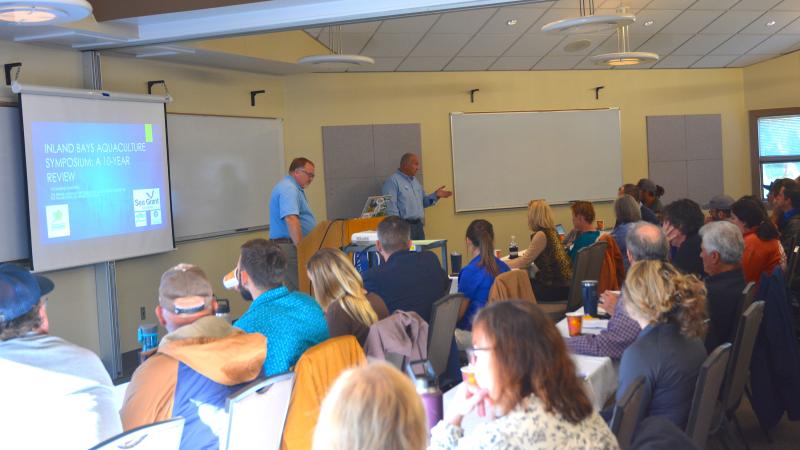Industry professionals gather at symposium to evaluate Delaware’s Inland Bays progress after 10 years
Posted by Leslie Kopp & Christi Arndt on Tuesday, November 14th, 2023 at 10:15am
Credit to: Chris Flood, Cape Gazette
Now a decade into the rebirth of shellfish aquaculture in Delaware’s Inland Bays, the program is still struggling to take hold. Topping the list of reasons why is that watermen do not have access to a commercial dock, said Delaware Aquaculture Association President Mark Casey.
Infrastructure is the biggest barrier, said Casey, and a good commercial dock on the west side of Rehoboth Bay is what the industry needs. A dock would save aquaculturists time and money because there would be less time motoring to leases, he said.
Casey’s comments were made to a room full of industry professionals and people interested in the industry’s success during a symposium Oct. 24. Hosted by the Delaware Aquaculture Association, Delaware Sea Grant and the Delaware Center for the Inland Bays, the all-day event took place in the Virden Retreat Center on the University of Delaware campus in Lewes. The symposium had three goals: offer an overview of how the industry came to be and its current status; to identify constraints on industry growth; and to chart a path forward for Delaware's aquaculture industry.
In the 1940s, ‘50s and ‘60s, there was a thriving shellfish industry in Delaware’s Inland Bays, but over-harvesting and disease wiped out much of the populations. The situation got worse in the years following, when water quality decreased due to pollution from outfalls and development. In an effort to revitalize the environment and the industry, former Gov. Jack Markell signed legislation in August 2013 creating a commercial shellfish aquaculture industry in the Inland Bays. Delaware was the last state on the East Coast to adopt aquaculture legislation. Five years later, in early 2018, the first aquaculturists put cages in the water.
Casey said he can remember what the bays used to look like – clean, with grasses that had softshells in them.
“This is what drives me,” he said. “This is really near and dear to my heart.”
In addition to no commercial dock, Casey said, initial investment money and lack of a strategy for how to grow the industry are also barriers.
Bob Rheault, a two-decade waterman in Rhode Island and representative of the East Coast Shellfish Growers Association, said the industry has 23 federal acts of Congress and more than 1,000 federal regulations it has to follow related to food safety and production.
“It’s an amazing maze of regulations,” said Rheault.
Regulations are good to a point, he said, and there should be enough to maintain food safety, but not enough to limit creativity on how a grower wants to grow. Rhode Island is comparable to Delaware, he said.
“The industry generally likes regulations because it prevents illnesses, pollution and allows for fair competition,” said Rheault, adding that the key is to enforce the rules that are in place strictly, with tough penalties.
Rheault made a number of suggestions that could be implemented – a one-stop place for permit applications, a central leasing authority and having an aquaculture coordinator; transferable leases as long as the new lessee is using the same basic method; and site leases with GPS.
Rheault wholeheartedly agreed with Casey about the need for a commercial dock if the industry is ever going to take off.
“Access is critical,” said Rheault. “You can’t have a farm if there are no commercial slips.”
David Christopher, representing Delaware Sea Grant, said there are challenges with career awareness at a young age. Students either think they can’t do it or they don’t know about it, he said.
Ed Hale, fisheries and aquaculture extension faculty with Delaware Sea Grant and assistant professor in the University of Delaware’s School of Marine Science and Policy, also spoke at the symposium about how oysters improve water quality and how studies show aquaculture cages can have a halo effect, providing habitat to other animals.
It’s not a huge industry, but there's huge growth potential, said Hale.




Leave A Comment